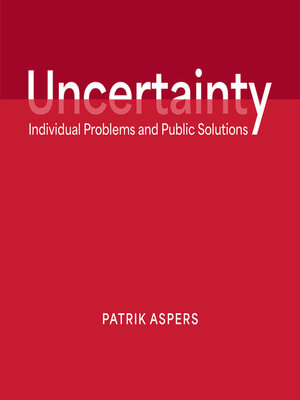
Sign up to save your library
With an OverDrive account, you can save your favorite libraries for at-a-glance information about availability. Find out more about OverDrive accounts.
Find this title in Libby, the library reading app by OverDrive.



Search for a digital library with this title
Title found at these libraries:
| Library Name | Distance |
|---|---|
| Loading... |
In Uncertainty, Patrik Aspers provides detailed analysis of publicly available means of uncertainty reduction. Drawing on phenomenology, social constructionism, and the sociology of knowledge, Aspers considers the meaningful differences between uncertainty and risk, the different ways people cope and have coped with uncertainty through history, the importance of knowledge and science to reducing uncertainty, and the trade-offs involved in reducing forms of uncertainty while leaving open opportunities for others.
People may have access to unique and private knowledge that reduces their uncertainty when making decisions. Publicly available knowledge is central for building a society that enables communication based on shared ideas and understanding, instead of falling into bubbles, echo chambers, and private truths. Examples include institutions, laws, standards, evaluation, competition, and ranking. The book addresses how these reduce uncertainty and how these ways are created.
Examining what people can and in fact do to reduce uncertainty, Aspers addresses the existential dimension of uncertainty, the collective efforts and socially produced outcomes that lead to reduced uncertainty, and the social order that results.
People may have access to unique and private knowledge that reduces their uncertainty when making decisions. Publicly available knowledge is central for building a society that enables communication based on shared ideas and understanding, instead of falling into bubbles, echo chambers, and private truths. Examples include institutions, laws, standards, evaluation, competition, and ranking. The book addresses how these reduce uncertainty and how these ways are created.
Examining what people can and in fact do to reduce uncertainty, Aspers addresses the existential dimension of uncertainty, the collective efforts and socially produced outcomes that lead to reduced uncertainty, and the social order that results.







